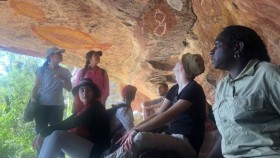Richard Callaghan
I have taught the dreaded subject of Biochemistry to Medical and Science students for almost 20 years and nobody has fallen asleep in a lecture yet!
Group research focus
There are two main research interests of the team. The first investigates how cells become resistant to chemotherapy; primarily in the treatment of cancer. In particular, we focus on drug pumps that prevent drugs entering the cells and causing their demise. The work is fundamental biochemistry and aims to provide a molecular understanding of how these pumps can recognise so many different types of drugs and move them out of cells. Once we understand this property, it will be possible to engineer ways to overcome their unwanted actions. The other main research priority is to develop new ways to kill cancer cells by targeting 'quirks' in their cellular biology such as altered metabolism and through novel drug delivery systems that evade resistance pathways.
Teaching and research achievements
A huge proportion of my research career has been spent trying to unravel how a particular drug pump in cancer cells is able to bind and transport close to 300 drugs. The research teams I have been involved with provided the first structural data on this pump back in 1997. The structural information is being used to generate a map of drug binding sites on the protein. This has been a goal of mine for >20 years and we are now very close to achieving it.
I have taught the dreaded subject of Biochemistry to Medical and Science students for almost 20 years and nobody has fallen asleep in a lecture yet! At Oxford I developed the first graduate training program in the Medical Sciences Division and the program was subsequently adopted across the University.
What do you enjoy most about teaching?
I enjoy teaching and interacting with students that show a real passion and curiosity for the topic, whatever discipline this involves. In September, I am off to the UK to learn a novel procedure that was developed by one of my former D. Phil. students and seeing the student-teacher profile turned on its head is quite gratifying.
Who is your science hero?
My scientific hero is actually a British engineer with a very extravagant name – Isambard Kingdom Brunel. He was however, a quintessential scientist because of his extraordinary problem solving ability. No project was too difficult or impossible to overcome with ingenuity. His feats in the 1800s changed the field of engineering forever and his achievements are still standing, or in operation, 200 years later.
- This profile originally appeared in the RSB newsletter, issue 77, July 2016.
- Callaghan Lab - Human disease and membrane transport
- Profile of Richard Callaghan








